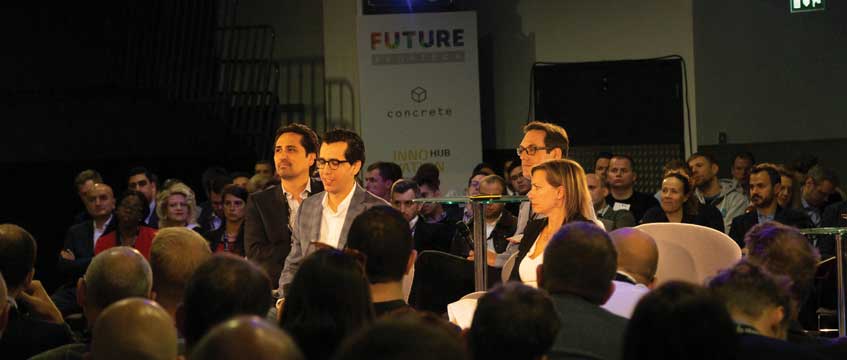If real estate and technology had a relationship status, it would probably be: “It’s complicated”.
That is what some of the world’s largest investors in proptech alluded to when they congregated at Future Proptech earlier this year to share their thoughts on future investment strategies.
During the session, Fifth Wall’s principal co-head of investments Roelof Opperman said the industry is going through a “very confused period” trying to understand how to integrate, or even respond to, technology, while Moderne Ventures founder and managing partner Constance Freedman agreed, saying that property is “at the beginning stages” of proptech and is “trying to figure this out”.
Yet proptech remains irresistible to investors. Most notably, 2018 marked the height of SoftBank’s love affair with WeWork with around $5.2bn (£4.24bn) pumped into the co-working giant. This year, $1bn was raised by freight logistics company Flexport, and Fifth Wall announced in July that it had closed a new $503m fund – the largest proptech investment fund to date.
But what exactly do venture capitalists look for in a proptech company that makes them dig into their billion-dollar-deep pockets?
Opperman and Freedman were joined by SoftBank Vision Fund partner Justin Wilson and JLL Spark data vice president David Gerster to outline what kind of companies get them excited enough to open their chequebook, what causes them to keep those aforementioned books firmly shut, and where they see proptech investment heading in the future.
What’s hot…
Freedman outlined the areas of investment the early stage capital fund is looking at investing. Sustainability and AI are “table stakes” investment opportunities for the venture fund, she said, while the growth of robotics and its links with the senior living industry are keen areas of interest.
Companies providing sustainability solutions are “much more interesting here in Europe than… in the States”, said Freedman, and added that robotic dogs and drones delivering packages “can make a big difference in the senior housing [sector]”.
Opperman, meanwhile, outlined two key sectors that Fifth Wall is looking to invest in. “We’re seeing huge demand for tenant engagement software,” he said. “Why is it I can use my phone for everything, but I can’t use my phone to get into a building?”
He said Fifth Wall is “taking off a ton of projects” in this space for LLPs in Europe.
The second category of interest is a completely new asset class: cloud kitchens. He explained this as follows: imagine you are a restaurant owner in West London, and you’re seeing a surge in demand for your cuisine in East London – an area which is currently unfeasible for you to reach.
Traditionally, you would build a new restaurant in East London, argued Opperman, which comes with added extra costs, such as establishing a front of house. “What if you could just build a kitchen and do deliveries from that kitchen?” said Opperman. “There’s a whole ecosystem of start-ups focusing on that. From a real estate perspective, you can take in a light industrial, and in some cases obsolescent retail [space], and convert it into a cloud kitchen,” he said.
JLL Spark has also identified proptechs in the tenant engagement space as areas of interest. On the office side, the fund backed HqO, a tenant experience platform for commercial real estate, in its funding round in September last year, which raised $6.6m. On the residential side, it has invested in Lively, an operating system and smartphone app that tenants can use to pay rent, log maintenance requests, book amenities and other services too.
Gerster said “the days of the ID card are numbered” as tenants seek a better building experience. “Everyone is walking around with a smartphone in their pocket, and whatever kind of building you’re in – whether it’s your apartment building in a multifamily complex or your office – tenants are increasingly expecting this control hub that just plugs them into whatever building they’re in.”
… and what’s (kind of) not
Some investors, such as JLL Spark, have found opportunities in the commercial market, while others such as SoftBank said they have found it more challenging to invest in.
Wilson said the fund has “struggled” to find investment opportunities outside the residential sector, with the commercial market proving to be more fragmented and showing “a lack of full staff solutions and innovators to solve a whole host of problems a lot of operators are actually experiencing”.
The Japanese venture capitialist powerhouse is more interested in investing in proptech companies which tap into sectors “that are going to be a little more resilient through downturns”, such as the residential market.
Creating an investment strategy
Where most criticise property companies for their slow and hesitant adoption of technology, JLL Spark is an example of a real estate organisation turning this critique on its head.
Since 2017, when the agent launched its standalone global venture fund, a $100m wedge of capital has been given to the VC arm to pump into proptech start-ups. So far, more than 10 investments have been made.
Although JLL Spark has not disclosed how much time has been allocated over how it will spend its $100m pot, it signifies JLL’s commitment to understanding and harnessing new technologies. The fact that it headhunted former Groupon senior executive Mihir Shah to spearhead the initiative underlines this commitment.
Aside from Lively, JLL Spark has recently invested in online office agent Hubble, which secured £4m in funding in January. Last year, JLL Spark announced seven investments into companies including Skyline AI, Honest Buildings, Dealpath, Jones, HqO, Vergesense and Stressa.
Europe: challenges and opportunities
According to Opperman, the main challenge that proptech entrepreneurs face in Europe is convincing the market to back their start-up as it tries to get off the ground.
“The real estate industry itself is a little conservative in Europe; you have a lot more consolidation here than you do in the US,” he said. “You basically have four or five entities that control London, and three or four in Germany. In the US, it’s much more fragmented.”
But while start-ups may find it harder to penetrate this more exclusive European market, they do have the advantage of learning from the US. Opperman said he thinks this market is two or three years behind the US.
“There’s been a ton of change in US real estate tech in the last two or three years, and I think that’s just about to happen in Europe,” said Opperman. “In a lot of ways, [that’s] an advantage here because you can learn from the lessons and the mistakes we made in the US.”
So while investors face challenges, specifically with regard to finding opportunities in the residential market, VCs are targeting the multifamily and tenant engagement sectors, seeing these as markets that will only continue to grow.
And as Europe catches up with the US proptech boom, real estate companies should take note of the new technologies that could give them that all-important competitive business edge.
Perhaps then will real estate’s relationship with technology change from “it’s complicated” to become more of a partnership.
To send feedback, e-mail lucy.alderson@egi.co.uk or tweet @LucyAJourno or @estatesgazette











